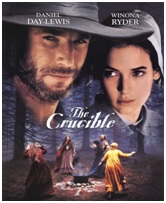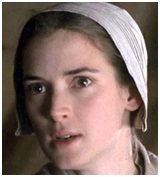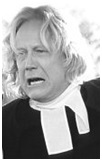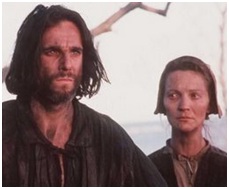|
 |
|
 |
|
|
||
The Crucible - Ethics, Leadership and Success
The Crucible (1953)
A play by the American, Arthur Miller (1915- 2005), pictured right, who also wrote Death of a Salesman (1949).
Fun facts • Based on the trial and execution of 19 innocent “witches” in the Puritan (strictly
religious) village of Salem, Massachusetts, USA, in 1692 • Inspired by McCarthyism, the witch-hunt against communists in America in the 1950’s, led by Senator Joe McCarthy. • Miller’s second wife was the movie star, Marilyn Monroe (pictured right together). • A 1996 film of the play starred Daniel Day-Lewis and Winona Ryder
Key characters John Proctor, farmer. Elizabeth Proctor, his wife. Abigail Williams, his ex-lover and ex-servant. Reverend John Hale, church minister and famous witch finder. The story It is 1692 in the town of Salem, Massachusetts. Its people are Puritans, who live strictly according to the Bible. Salem’s minister, Reverend Samuel Parris, finds some girls dancing in the forest with his:
Betty becomes ill, leading to rumours of witchcraft. Thomas Putnam (a wealthy farmer) and his wife, Ann, visit Parris, and conclude that witchcraft has caused Betty’s illness (as revenge against Parris for getting the minister’s job their relative wanted). John Proctor, a farmer, tells Abigail, his former lover and ex-servant, that their affair is over. Reverend John Hale, a famous witch finder, arrives looking for signs of witchcraft in Betty. Tituba is forced to confess that she was talking to the devil Abigail accuses many people of being witches including (out of jealousy) Elizabeth, Proctor's wife. The Putnams accuse the kind Rebecca Nurse, because they want her land and are jealous of her children. With Deputy Governor Danforth as the judge, a court is set up to try the accused, where Proctor
confesses his affair with Abigail. He also says that Abigail is jealously trying to kill his wife, Elizabeth, who denies the affair to protect her husband's honour. Under Abigail's direction, the girls in the court start to scream which frightens Mary Warren (Proctor's servant) into saying that Proctor is the devil's man. Proctor is found guilty, even though Hale knows that he is innocent On the morning of his execution, Proctor has a last chance to confess to witchcraft and save his life. He is persuaded to do so after seeing Elizabeth who escapes hanging because of her pregnancy. But he then saves his reputation and honour by refusing to confess. He is executed along with Rebecca Nurse. Abigail disappears and later becomes a prostitute in Boston. Elizabeth marries again four years after Proctor's execution.
What does the play tell us about ethics, leadership and success?
1. Don’t persecute people for their views Innocent people in Salem are convicted of witchcraft, simply because their views are unorthodox or unpopular. Many people are resistant to new ideas because of their strict Christian ideology. But in Salem there was too much order from prohibition at the expense of people's freedom of thought. The first Act's overture says: “All organization is and must be grounded on the idea of exclusion and prohibition”.
2. Stick to your principles Principled John Proctor (Daniel Day-Lewis, pictured right at his execution, in the 1996 film) dies with honour in the face of intense pressure to confess to something he didn’t do. In contrast, Hale doesn’t have the courage to defend him, despite knowing that a great injustice has been done. Miller called the play, The Crucible, because it is a container in which heat purifies metals. Similarly John Proctor triumphed over the fire of hatred to purify his soul by acting according to his conscience.
3. Evil leads to ignorance The vindictively jealous and greedy Abigail shows no remorse after John's execution and leaves Salem, having stolen her uncle’s savings.
4. Work out wisdom for yourself Innocent people are executed because, through fear, suspicion and ignorance, people unquestioningly believe that they are guilty of witchcraft. John and Elizabeth are heroes, because they stand up for truth and force Reverend Hale to challenge his opposition to witchcraft.
5. Leadership matters John and Elizabeth show moral leadership by fighting for their principles But others only like power for their own advantage: a) Abigail (Winona Ryder, pictured right, in the 1996 film) She leads and manipulates others to convict Elizabeth, particularly
b) Deputy Governor Danforth (who orders the execution of innocent people to appear strong and decisive). c) Reverend Parris (Bruce Davison, pictured right, in the film) (who uses the trial to strengthen his position as Salem’s minister).
6. Learn from your mistakes John’s affair makes him more aware of his love for Elizabeth who realizes that her lack of forgiveness towards John’s affair is destroying their relationship. 7. Trust and forgiveness are vital to good relationships John and Elizabeth (pictured right together in the 1996 film) are finally happy, having forgiven one another and re-gained each other’s trust.
8. Remember your reputation John finally refuses to confess, which costs him his life but saves his reputation.
9. Vengeance is vile Jealousy leads to Proctor, Elizabeth and Rebecca being hypocritically victimized in the name of God.
10. Life is sacred Laws are mistaken, if they condemn innocent people like John Proctor, because Reverend John Hale says: “Life is God’s most precious gift”.
Key quote on happiness How may I live without my name?, John Proctor on saving his reputation
Key quotes on ethics and religion Life is God’s most precious gift; no principle, however glorious, may justify the taking of it, Reverend Hale. Theology is a fortress; no crack in a fortress may be accounted small, Reverend Hale.
Key quote on family A child’s spirit is like a child, you cannot catch it by running after it; you must stand still, and, for love, it will soon itself come back, Rebecca Nurse.
Key quote on management All organization is and must be grounded on the idea of exclusion and prohibition (overture before the first Act)
Two best literature websites 1. sparknotes.com 2. litcharts.com
|
|
|
||
|
|
||
| Copyright © wisdomtowin.com 2025 All Rights Reserved | ||
|










